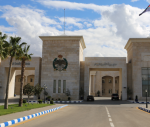You are here
The growing Mideast fraternity of media-control thugs
Aug 10,2017 - Last updated at Aug 10,2017
The Israeli government move to close Al Jazeera television network’s operations in the country is not surprising in itself, given that the government’s irritation with Al Jazeera for the past two decades of comprehensive, live coverage of events in Israel and the Arab territories it occupies (Palestine) or wages war against (Lebanon).
The striking aspect of the Israeli government move was its explicit linking of this to the policies of the four Arab states that are laying siege to Qatar and themselves demanding the closure of Al Jazeera. This is fascinating for several reasons, including that autocratic regimes dislike the work of a free and professional press, and Israel’s desire to forge closer relations with Arab Gulf states in order to allow it virtual carte blanche in dealing with the Palestinians who are in a very weak position these days.
This pattern of behaviour defines not only Israel and Arab autocracies like Saudi Arabia and Egypt, it is also more evident now in NATO member countries like the United States and Turkey, whose leaders openly wage war against the press. This is in keeping with the modern legacy of autocrats who usually blame the media and foreign actors for their troubles when they are challenged at home.
The Israeli decision to close Al Jazeera reflects a wider tendency among autocrats in several continents to try and control their societies by totally shaping the flow of news and views in society. This is a pivotal step on the path from majoritarian or legitimate rule, to autocracy, to authoritarianism, and finally to totalitarianism in which citizens are treated like robots or children.
This is most obvious in many Arab countries where the mass media is a bland, wet sack of innocuous texts and audio-visual materials reflecting the different angles of a single government — defined viewpoint, often associated with hero-worshiping the great leader of the country. Israel is unable to do this with its vibrant domestic Hebrew-language press, but by closing Al Jazeera it is trying now to join the ranks of the Arab governments that prohibit any media coverage that is critical of state policies.
It is no surprise that Al Jazeera television network has now been targeted by both Arab and Israeli governments, because the network reveals the realities of these societies that governments would prefer were not known to the public. Al Jazeera rocketed to its success in just a few years after its birth in the mid-1990s precisely because it covered all the important news stories and political developments in the Arab world that ordinary Arab citizens cared about. These included ongoing developments in Palestine, the impact of the Israeli war and siege of Gaza, the Anglo-American war on Iraq, the Arab uprisings of 2010-11, and other developments that were important on a regional level, and not only as local or single-country stories.
As such, Al Jazeera reflects in one sense the continuing existence of a pan-Arab sentiment that ordinary citizens express simply by being interested in stories of other Arab citizens fighting for their rights, dignity, and wellbeing, whether in Iraq, Syria, Palestine, Egypt, Saudi Arabia, Yemen or Bahrain, to mention only a few stories of regional interest. So in the eyes of Israel, Arab autocrats, and occasional angry foreign governments, Al Jazeera is a dangerous phenomenon that “incites violence”, in the eyes of Israel, or “promotes terrorism” and dangerous groups like the Muslim Brotherhood, in the eyes of Saudi Arabia, the United Arab Emirates, Egypt, and a few other Arab autocracies whose own media have become embarrassing sinkholes of empty mediocrity spiced up with intermittent attack dog texts.
Al Jazeera’s real danger is that it gives public voice to the sentiments of hundreds of millions of ordinary Arab men and women who are not allowed to express their views in public in any meaningful way, or to mobilise their collective views into practical political action. Perhaps autocratic regimes have good reason to be afraid of Al Jazeera, given the mass Arab public sentiment of the 2010-11 uprisings that sought to change or radically reform long-running Arab governments anchored in individual families.
These regimes are not stupid, for they demonstrate that they do understand why Al Jazeera is so dangerous to them and their eternal incumbency. Yet these regimes are also infantile and naive in thinking that by banning Al Jazeera, by turning their own media into disgraced dishrags, and by trying to both control and shut the minds of their own citizens on public issues, that they can forever maintain their countries in the state they are in today. This show of high-level incompetence by these regimes ignores how in our world of digital and social media it is impossible to fully control the flow of news and views in any society.
Social media penetration rates in Saudi Arabia, the UAE, and other Gulf Arab states are among the highest in the world, because citizens — especially young ones who comprise some 60 per cent of the population — thirst for a wide range of public views and personal entertainment alongside their desire to express themselves and discuss with others issues that matter to them.
So banning any media company (like Al Jazeera) or tool (like WhatsApp) backfires because it usually generates a greater desire by the public to access those things. It also makes the government look more dictatorial, reduces its respect and perhaps even some of its legitimacy in the eyes of its own people, sends it into the international fraternity of media-control thugs, and widens the gap between citizen and state that can only lead to social and political tensions.













